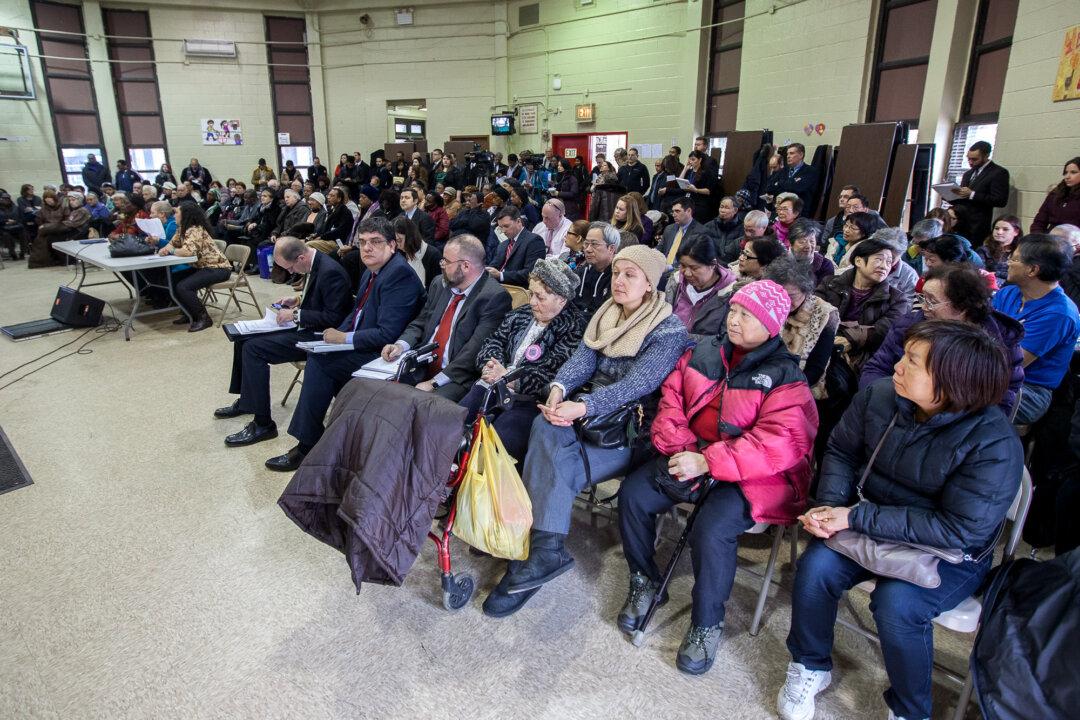NEW YORK—People in Coney Island public housing often heat their frozen apartments with ovens and shower with cold water. As if that wasn’t enough, New York City Housing Authority gave them another cold shower—a permanent solution is years away.
Members of the City Council’s Public Housing Committee listened to local residents’ complaints Thursday about failing mobile boilers, which provide heat and hot water in 110 public housing project. A mobile boiler is a truck-sized piece of equipment that sits outside a building and delivers heat via pipes.
For the first time in its history, council hosted the Thursday hearing at a community center in a public housing project on Coney Island.
Two NYCHA executive vice presidents came to testify and explain breakdowns of the 26 mobile boilers deployed in the city a year ago to fill in for equipment flooded by Superstorm Sandy. They estimated it would take another two years to switch from the mobile boilers to permanent ones.
Residents said the boilers, stationed on sidewalks outside the buildings, are loud, smelly, and break down on a regular basis. Anecdotal evidence suggests that some parts of the boilers were not made for open-air operation in freezing temperatures.
Shirley Aikens, president of a tenant association at Carey Gardens, a public housing project with almost 1,700 residents, testified about a case of a broken heat pump cutting one of the buildings from heat for four days.
“A lot of times these pumps break down,” she said. “When they break down, everybody’s in the cold.”
“We have no choice, but to turn on the stove,” Aikens said, referring to the hazardous practice of using the stove to heat an apartment.
Raymond Ribeiro, NYCHA executive vice president for capital projects, said that the mobile boilers are breaking down just as often as any other boiler but don’t have back up systems, which built-in boilers have.
Moreover, the damage done by the storm to the heat distribution systems in some buildings still isn’t repaired.
Money
Ribeiro said if NYCHA only wanted to repair the original boilers, it would cost $400 million and would already have been done. Yet NYCHA doesn’t want to put the boilers back in the buildings’ basements and wait for another storm to flood them.
They want another $260 million to build standalone boiler buildings, resilient enough to withstand the elements.
Yet all the funding agencies, be it insurance companies, Federal Emergency Management Agency, or the Community Development Block Grant, doubt the resiliency project is necessary.
For that reason NYCHA has not yet contracted a project for the new, resilient boilers. Ribeiro said it would be “irresponsible to move forward with detailed designs for projects that we have no funding commitments for.”
Meanwhile, the mobile boilers are operating for the second winter. Each costs about $17 million. The rental cost is one million per month.
Councilman Mark Treyger recommended that NYCHA refund rent to every NYCHA resident in the city for every day they lacked services such as hot water or heating. Ribeiro replied that he will bring the recommendation back to the NYCHA.
Insurance Money
The city’s the public developments were insured for up to $440 million before Superstorm Sandy. NYCHA made claims for the whole sum, but has so far received only $187 million. NYCHA is regularly meeting with the insurance agencies, more than 20 of them, Ribeiro said, but getting the money is a long process.
Treyger asked Ribeiro to provide names of all the insurance companies and promised the council will “have every level of government” looking at the insurance contracts.
“They’re withholding money that are rightfully owed to folks here,” he said. “Maybe we shouldn’t do business with them,” he added later.
Although no changes are expected this winter, NYCHA residents may see some improvements next year. Over the summer, the authority plans to rework the mobile boilers so they would have back up systems. The boilers could also be connected to natural gas pipes inside the buildings, so they would be cleaner and cheaper to operate.





